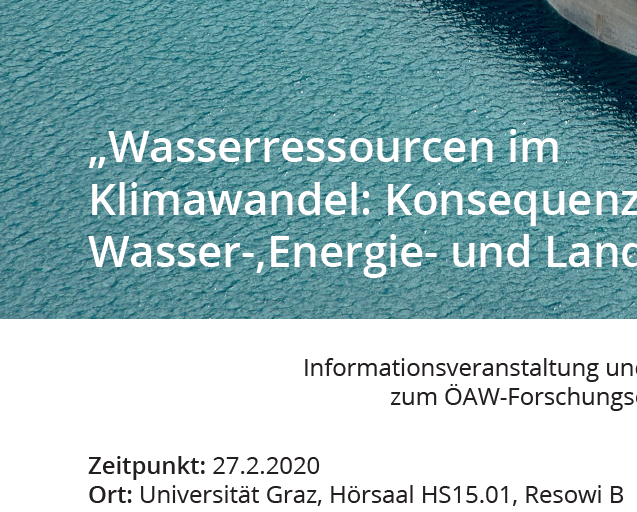Zeitpunkt: 27.2.2020
Ort: Universität Graz, Hörsaal HS15.01, Resowi B
(siehe Lageplan unter https://campusplan.uni-graz.at/015BEG0002)
Wasserressourcen im Alpenraum sind in besonderem Maße von Auswirkungen des Klimawandels und von menschlichen Eingriffen betroffen. Die Konsequenzen für die Wasserwirtschaft, den Energiesektor und die Landwirtschaft sind bislang noch unzureichend verstanden. Seit Mitte 2019 werden von der Österreichischen Akademie der Wissenschaften (ÖAW) vier interdisziplinäre Forschungsprojekte zum Thema Grundwasser gefördert, die eine Einbindung von Stakeholdern und Praxis-Akteuren anstreben. Im Zuge der Veranstaltung werden diese Projekte vorgestellt und es soll mit maßgeblichen Stakeholdern sondiert und diskutiert werden, welche Forschungsfragen aus
ihrer Perspektive aktuell besonders wichtig sind.
KURZBESCHREIBUNG DER VIER FORSCHUNGSPROJEKTE
- ClimGrassHydro untersucht in einem weltweit einzigartigen Experiment die Auswirkungen von Dürreereignissen unter verschiedenen Klimaszenarien auf den Wasserhaushalt und die Produktivität von bewirtschaftetem Grünland.
- Ziel von RechAUT ist Grundwasserneubildungsraten zu bestimmen, deren zukünftige Änderungen unter Berücksichtigung von Unsicherheiten auf unterschiedlichen Skalen vorherzusagen, und daraus resultierende Konsequenzen für die Landnutzung und das Wassermanagement für Österreich abzuschätzen.
- Integrative Groundwater Assessment untersucht die Auswirkungen hydrologischer Extremereignisse auf den hydrologischen, hydrochemischen und ökologischen Zustand von Grundwasserkörper in den Alpen und deren Vorland, um Indikatoren zu entwickeln, die sich zur Überwachung und Beurteilung von Klimawandeleffekten auf Grundwassermenge und -güte eignen.
- Flowcast entwickelt neue Methoden zur Charakterisierung von Struktur, Kapazität und Empfindlichkeit von Karstgrundwasservorkommen. Dies geschieht durch Kombination und neuartige Auswertung von Daten aus Bodenmessungen und eines neu entwickelten Drohnen-Flugmeßsystems.
